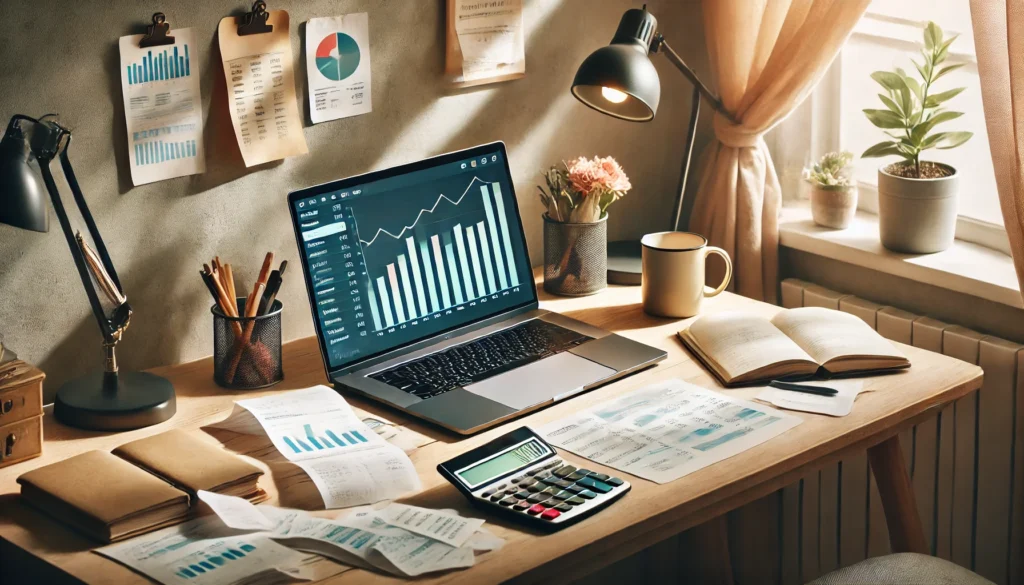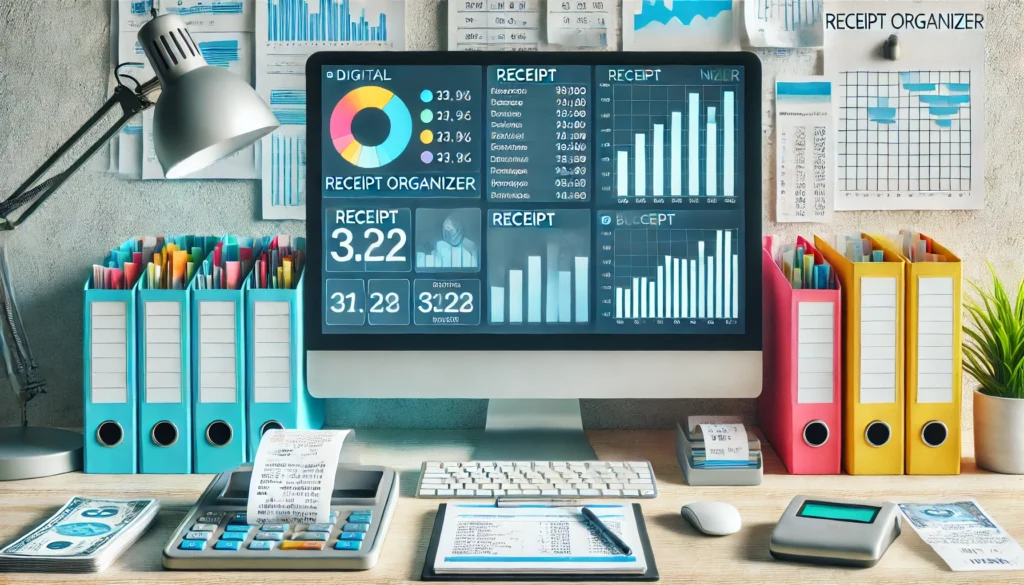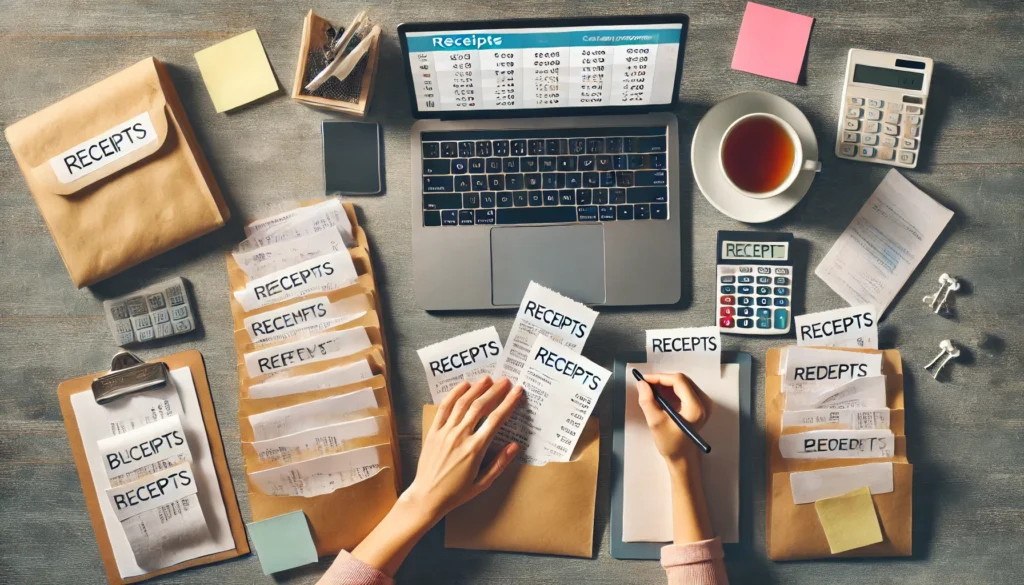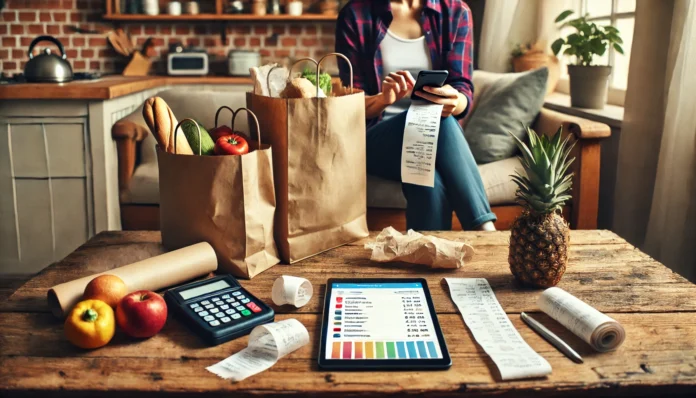Frugal living, once thought of as simply pinching pennies, has evolved into a lifestyle rooted in mindfulness, efficiency, and the strategic use of technology. In an era where digital solutions are reshaping financial habits, receipt organizer software has emerged as a transformative tool for individuals committed to saving more and spending smarter. More than just a digital filing cabinet, this software empowers users to track receipts, analyze spending patterns, and make informed decisions that align with their long-term financial goals. By turning everyday purchases into data-driven insights, receipt management software becomes a critical asset for anyone looking to revolutionize their approach to frugal living.
You may also like: 10 Genius Frugal Living Hacks: Effective Ways to Save Money on Household Bills
The act of frugal living is not about deprivation; it is about intentionality. It requires a sharp awareness of where money is going and how spending habits align with personal values. Receipt software bridges the gap between day-to-day transactions and strategic financial planning, helping individuals reclaim control over their finances. This detailed exploration uncovers how receipt tracking software empowers users to make smarter decisions, avoid wasteful spending, and foster long-term financial wellness.

The Hidden Value of Every Receipt
For many, receipts are little more than disposable slips of paper—useful for a moment, then discarded or stuffed into a drawer. Yet within each receipt lies valuable information that, when harnessed correctly, can transform the way individuals engage with their finances. Receipt tracking software brings order to this chaos, converting paper clutter into organized, searchable records. This shift from passive collection to active tracking enables a more disciplined and data-informed approach to money management.
Each receipt holds granular details that can reveal spending patterns often missed in traditional budgeting. For instance, someone might believe they spend moderately on dining out, but a detailed review of receipts might show weekly habits that quietly amount to hundreds of dollars monthly. Receipt organizer software not only aggregates these insights but also provides visual analytics that illuminate trends and flag anomalies. This depth of detail helps individuals identify areas of overspending and reallocate funds toward higher-value goals such as debt repayment, emergency savings, or investing.
Moreover, this organized approach to receipts enhances accountability. Knowing that every purchase will be logged and reviewed fosters more mindful spending behavior. Users often find themselves pausing before making impulsive purchases, recognizing that the decision will be visible in their financial reports. Over time, this subtle psychological shift contributes significantly to better financial outcomes, reinforcing the principles of frugal living without requiring drastic lifestyle changes.
Leveraging Receipt Software for Budget Optimization
Receipt management software goes beyond simple storage. It offers sophisticated tools that integrate seamlessly with budgeting platforms to create a holistic view of one’s financial health. These systems categorize expenses, calculate averages, and compare spending across different time periods. By offering real-time feedback and budget adherence metrics, receipt software for small business and personal use alike can play a critical role in identifying and correcting financial inefficiencies.
For individuals practicing frugal living, such insights are invaluable. The software can track receipts from various sources, whether digital or physical, and aggregate them under intuitive categories such as groceries, utilities, transportation, or entertainment. This level of detail makes it easier to set realistic budgets that reflect actual spending rather than estimations or assumptions. Over time, patterns emerge that reveal areas where cost-saving measures can be implemented without compromising quality of life.
Furthermore, the best receipt tracking software offers forecasting tools that project future expenses based on historical data. These projections help users prepare for seasonal fluctuations, recurring charges, or potential emergencies. By aligning budgeting efforts with actual financial behavior, receipt software transforms aspirational budgets into practical, actionable plans. This bridge between intention and execution is where frugal living truly takes root, enabling users to achieve consistency and discipline in their financial habits.
The Psychology of Financial Mindfulness Through Digital Tools
Frugal living is as much about mindset as it is about money. The discipline required to live within one’s means, delay gratification, and prioritize long-term goals often hinges on self-awareness and intentional behavior. Receipt organizer software fosters this psychological mindfulness by making spending visible, traceable, and accountable. It functions not only as a financial tool but as a behavioral reinforcement mechanism that nudges users toward healthier money habits.
One key psychological benefit of using a receipt tracking app for small business or personal finance is the reinforcement of delayed gratification. When users regularly review their expenses and see the cumulative cost of small, frequent purchases, they are more likely to postpone non-essential spending in favor of savings. This dynamic mirrors cognitive behavioral strategies often used in habit formation, where awareness and reflection are critical to change.
Additionally, receipt software reduces the cognitive load associated with managing money. By automating categorization and analytics, it frees mental bandwidth for strategic thinking rather than rote record-keeping. This ease of use lowers barriers to financial engagement, encouraging more consistent interaction with personal budgets. The more frequently users engage with their financial data, the more attuned they become to the consequences of their spending choices.
Ultimately, the use of digital tools in cultivating financial mindfulness exemplifies the modern evolution of frugal living. It is no longer about stringent denial but about informed decision-making powered by real-time data. Receipt organizer software, in this light, becomes a catalyst for behavioral transformation, reinforcing the values of simplicity, purpose, and intentional living.
Practical Applications in Everyday Frugality
While the theoretical benefits of receipt software are compelling, its real value lies in its practical application. Consider the routine grocery trip—a weekly errand that, over time, represents a significant portion of most households’ budgets. With receipt tracking software, users can monitor price changes, identify frequently purchased items, and assess cost trends across different stores. This data-driven approach allows for smarter shopping, including taking advantage of sales, using coupons effectively, and avoiding overpriced convenience items.
Similarly, the software is invaluable in managing recurring expenses such as utilities, subscriptions, and insurance. Receipt management provides a clear historical record that can be used to contest billing errors, identify redundant services, and benchmark rates against market standards. For instance, a user might discover that their internet bill has gradually increased over several months. With a receipt history in hand, they can negotiate a better rate or switch providers, resulting in tangible monthly savings.
Even discretionary spending, often the hardest to control, becomes more manageable with detailed tracking. Dining out, entertainment, hobbies, and other lifestyle expenses are often underestimated. Receipt software exposes these under-the-radar costs, offering a reality check that prompts users to seek more affordable alternatives. In this way, frugality is achieved not by eliminating enjoyment but by making it more conscious and cost-effective.
Receipt Tracking for Tax and Reimbursement Efficiency
Another significant benefit of using a receipt tracking app for small business or personal finance is its utility during tax season. Proper documentation of expenses is essential for maximizing deductions and avoiding audit risks. Receipt tracking software streamlines this process by organizing documents in IRS-compliant formats, tagging deductible categories, and generating reports that simplify filing.
For self-employed individuals and freelancers, the stakes are even higher. Receipt software for small business ensures that no deductible expense is overlooked, whether it’s mileage, supplies, meals, or home office costs. The ability to track receipts in real time minimizes the end-of-year scramble and provides peace of mind that one’s records are accurate and complete.
Reimbursement scenarios also benefit from organized receipt management. Employees who travel or incur job-related expenses often face delays or disputes due to incomplete documentation. With mobile receipt capture and cloud synchronization, users can submit expense reports quickly and confidently. This level of efficiency is not only convenient but also reinforces the principles of frugal living by ensuring that no reimbursable cost goes unclaimed.
Empowering Small Businesses to Embrace Frugality
The role of receipt software for small business extends beyond accounting. For entrepreneurs and small business owners, it becomes a strategic asset that informs decisions about pricing, vendor selection, and cost control. Accurate receipt management enables a granular understanding of where money is going, highlighting inefficiencies and uncovering opportunities for savings.
Receipt tracking software can reveal supplier inconsistencies, flag duplicate charges, and identify patterns in overhead expenses that may otherwise go unnoticed. For example, a bakery owner might discover that switching flour vendors saves $200 per month without compromising quality. These seemingly minor adjustments add up over time, reinforcing sustainable business practices that align with frugal principles.
Moreover, digital receipt management supports scalability. As businesses grow, manual methods of tracking receipts become increasingly untenable. Software solutions automate this process, ensuring continuity and accuracy while freeing up time for core business functions. This streamlined approach not only reduces stress but also ensures that financial decisions remain grounded in accurate, real-time data.
By embracing receipt software, small businesses gain the tools needed to operate leaner and smarter. The result is a healthier bottom line, increased competitiveness, and a business model rooted in intentional, resource-conscious growth.
Navigating the Features of High-Quality Receipt Software
Not all receipt organizer software is created equal. For individuals and businesses looking to maximize the benefits of digital receipt tracking, selecting the right platform is essential. Key features to look for include automatic OCR (optical character recognition), which extracts relevant data from images and PDFs, cloud integration for multi-device access, customizable categorization, and robust search functionality.
Security is another critical factor. Since receipts often contain sensitive financial data, top-tier software should offer encryption, two-factor authentication, and regular backups to protect user information. Compliance with financial standards such as GDPR or SOC 2 also adds an extra layer of assurance.
User experience plays a pivotal role in adoption and ongoing engagement. Intuitive design, mobile accessibility, and seamless integration with banking or accounting platforms enhance usability and ensure that users remain committed to tracking their finances. Support and scalability are equally important, particularly for receipt tracking software aimed at small business owners who may have evolving needs over time.
Investing in high-quality receipt software ultimately enhances every aspect of frugal living. The ease of use, reliability, and depth of insight provided by these tools turn everyday spending into a rich source of financial intelligence. Whether for personal budgeting or business operations, the right software empowers users to stay informed, proactive, and resilient in their pursuit of financial well-being.
Building Long-Term Financial Habits with Digital Accountability
One of the most transformative aspects of receipt tracking software is its ability to support lasting behavioral change. Unlike one-time budgeting efforts that fizzle out, digital receipt tracking embeds financial awareness into daily life. It encourages users to engage regularly with their spending data, reinforcing habits that lead to sustainable savings.
Consistency is the cornerstone of successful frugal living. The ongoing use of receipt organizer software ensures that spending stays aligned with goals over the long term. As users develop a rhythm of logging expenses, reviewing summaries, and adjusting budgets, they build a framework of accountability that resists backsliding. This steady engagement cultivates confidence and control, replacing financial anxiety with informed action.
Moreover, the historical data accumulated through receipt software becomes a powerful teaching tool. Reviewing past months or years offers insights into personal growth, changing priorities, and evolving values. It creates a narrative of financial development that can inspire continued progress and guide future decisions.
This process of digital accountability also nurtures transparency within households or businesses. Shared access to receipt data fosters collaborative financial planning, encouraging dialogue and mutual responsibility. In this way, receipt tracking software contributes not only to individual savings but also to stronger financial partnerships and communities.

Frequently Asked Questions (FAQ): How Receipt Organizer Software Can Revolutionize Frugal Living
1. How can receipt organizer software encourage better long-term financial habits beyond basic savings?
While receipt organizer software is often associated with day-to-day frugality, its real power lies in the behavioral shifts it fosters over time. By using a receipt tracking app for small business or personal finance, individuals begin to internalize patterns of mindful consumption. Over weeks and months, consistent use helps reinforce delayed gratification and prioritization of needs over wants. This isn’t just about avoiding overspending—it’s about developing an analytical mindset that instinctively tracks cause and effect between purchases and financial outcomes. With continued engagement, many users find they begin pre-emptively thinking in terms of value per dollar, making every purchase feel like a strategic investment rather than a passive transaction.
2. What are some creative ways receipt software for small business owners can support sustainability goals?
Receipt software for small business operations isn’t just a tool for cost-cutting—it can be a surprising ally in environmental accountability. For example, by analyzing digital receipts, businesses can identify suppliers with eco-friendly practices or track purchases of reusable vs. disposable goods. Some advanced receipt management software platforms now integrate carbon footprint metrics, encouraging owners to reconsider sourcing and shipping decisions. Additionally, going paperless through a receipt tracking app for small business dramatically reduces paper waste, aligning with broader ESG (Environmental, Social, and Governance) frameworks. Entrepreneurs who embrace this dual-purpose tracking can position themselves as both fiscally responsible and environmentally conscious—a compelling narrative for modern consumers.
3. How does receipt tracking software improve decision-making during periods of economic uncertainty?
During volatile economic cycles, precision in tracking becomes paramount. Receipt tracking software allows users to quickly assess spending trends and isolate non-essential costs that can be paused or eliminated. It acts as a real-time financial mirror, revealing how behaviors shift in response to inflation, layoffs, or industry slowdowns. For small business owners especially, receipt software for small business operations offers clarity when navigating difficult choices—such as renegotiating vendor contracts or pivoting marketing spend. Unlike traditional budgeting tools, receipt organizer software offers granular, transaction-level insight that provides context, not just numbers. In uncertain times, clarity equals confidence—and that’s exactly what this technology delivers.
4. Are there any psychological benefits to using an expense receipt tracker consistently?
Yes, and they’re more profound than most realize. Using an expense receipt tracker cultivates a sense of financial agency, which has been linked to reduced stress and increased life satisfaction. It creates a feedback loop where users gain confidence from small wins—such as discovering an overlooked subscription—then feel motivated to stay engaged. Over time, receipt management becomes part of a user’s identity as a conscientious consumer. This mindset shift reduces financial anxiety because it replaces reactive panic with proactive control. Additionally, seeing concrete data tied to personal choices allows users to separate emotion from decision-making, an essential skill in building long-term wealth and resilience.
5. What advanced features should high-volume users look for in receipt management software?
For users with significant transactional volume—such as freelancers, consultants, or multi-location businesses—the baseline features of receipt management software may not be enough. Look for automation capabilities like intelligent categorization, integration with accounting platforms, and optical character recognition (OCR) that improves accuracy. Some top-tier receipt software includes AI-powered insights that suggest spending optimizations or flag inconsistencies. Multi-user access, role-based permissions, and export-ready tax reporting are also vital features. Whether managing team expenses or handling high volumes of client invoices, the right receipt tracking app for small business use should adapt to scale rather than constrain it. This level of sophistication ensures operational efficiency without sacrificing oversight.
6. How can receipt tracking software help freelancers or gig workers streamline tax preparation?
For freelancers and gig economy workers, tax season often brings chaos and guesswork. Receipt tracking software eliminates this stress by providing a categorized, time-stamped record of all deductible expenses. Instead of scrambling through piles of receipts or memory-hunting for digital invoices, users can export organized reports within minutes. Many platforms also align with tax categories specific to Schedule C filings, making the expense receipt tracker a crucial compliance tool. Beyond tax season, the software helps users stay audit-ready year-round, reducing the risk of missed deductions or inaccurate reporting. In an economy where self-employed workers are rapidly growing, mastering receipt software for small business-style use is no longer optional—it’s strategic.
7. How might receipt organizer software evolve in the future with AI and machine learning?
The next frontier of receipt organizer software lies in predictive analytics and behavioral automation. Imagine a system that doesn’t just track receipts—it anticipates them. Through machine learning, future platforms may forecast recurring purchases, suggest cost-saving alternatives, or even trigger reminders when spending habits deviate from preset goals. Voice-to-receipt features and real-time AI categorization will make manual entry obsolete. Furthermore, receipt tracking apps for small business use are expected to become more industry-specific, offering customized dashboards for sectors like hospitality, healthcare, or logistics. As the technology evolves, these platforms will become not just reactive tools, but proactive financial co-pilots.
8. Can receipt software play a role in team collaboration for shared expenses?
Absolutely. In businesses or households where multiple people are involved in spending, centralized receipt management fosters transparency and accountability. Receipt software for small business teams often includes shared folders, approval workflows, and notifications, ensuring everyone stays aligned without micromanaging. In domestic scenarios, couples or roommates can use a shared receipt tracking app for small business-like collaboration to monitor grocery, utility, or rent-related expenses. This eliminates the guesswork in splitting costs and prevents misunderstandings. In both personal and professional settings, the visibility provided by receipt organizer software supports a culture of openness, efficiency, and shared financial responsibility.
9. What are some lesser-known industries where receipt tracking software is becoming essential?
Beyond the usual suspects like retail and consulting, industries such as construction, home healthcare, and even independent film production are increasingly relying on receipt tracking software. In construction, for instance, project managers use receipt organizer software to document materials and labor purchases, often in multiple currencies or job codes. Home healthcare providers use receipt software for small business operations to track mileage reimbursements, equipment purchases, and patient-related costs—all critical for both compliance and reimbursement. Independent filmmakers benefit by cataloging production expenses, helping them stay on budget and justify costs to investors. These niche applications reveal just how versatile and indispensable receipt management has become across modern professions.
10. How can individuals use receipt management tools to align spending with their personal values?
At its core, receipt management is about awareness—and with awareness comes alignment. By tracking expenses through an expense receipt tracker, users can evaluate whether their financial behaviors reflect their deeper priorities, such as supporting local businesses, eating sustainably, or minimizing fast fashion consumption. With custom tagging and search capabilities, users can filter their spending to see, for example, how much they’ve spent at farmers’ markets versus chain grocery stores. Over time, this data fosters intentional living, where each transaction becomes a choice that supports one’s values. Receipt software doesn’t just track receipts—it reveals truths about who we are and what we stand for.

Conclusion: Redefining Frugal Living in the Digital Age
Frugal living, far from being a restrictive or outdated concept, has found new vitality through the thoughtful use of technology. Receipt organizer software stands at the forefront of this evolution, offering a powerful means to track receipts, optimize budgets, and cultivate financial mindfulness. It enables users to understand their spending in granular detail, make intentional choices, and achieve lasting savings without sacrificing quality of life.
By turning routine transactions into actionable insights, receipt management software transforms the mundane into the meaningful. It bridges the gap between aspiration and execution, helping individuals and small businesses alike to embody the principles of frugality in practical, data-driven ways. The result is not just improved finances, but a more purposeful and empowered relationship with money.
In a world where every dollar counts, embracing the power of receipt software can be the key to unlocking a more sustainable, intentional, and fulfilling financial future. It is not merely a tool for saving—it is a catalyst for living well, spending wisely, and tracking every penny with purpose.
budget organization tools, digital money habits, smart spending software, expense tracking benefits, automated budget tracking, financial planning software, mindful spending technology, organize financial documents, frugal technology tips, personal finance automation, expense record management, tax deduction strategies, digital document organization, spending behavior analytics, home budgeting solutions, business expense optimization, financial awareness tools, money-saving apps, household budgeting insights, entrepreneur budgeting tools
Further Reading:
A Receipt Revolution? Transforming Record Keeping via the Cloud
Can a receipt scanner app improve your expensing process?
Receipt Storage: The Best Ideas for a Clutter-Free Life
Legal Disclaimer
The information provided in this article is for general informational purposes only and is not intended to constitute financial, investment, legal, tax, or other professional advice. The content should not be relied upon for making any financial or investment decisions. Readers are encouraged to consult with licensed professionals, such as financial advisors, attorneys, or tax experts, to obtain personalized advice tailored to their individual circumstances. The author and publisher disclaim any liability for any actions taken or not taken based on the information provided in this article.





